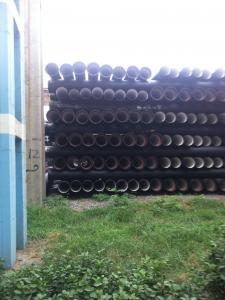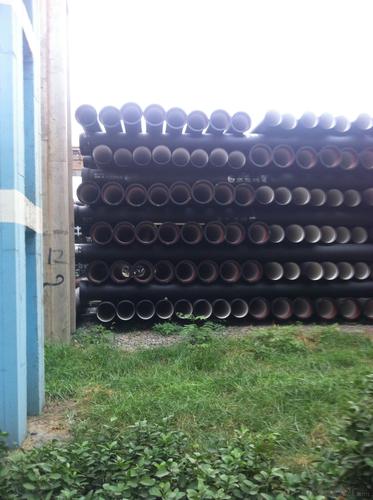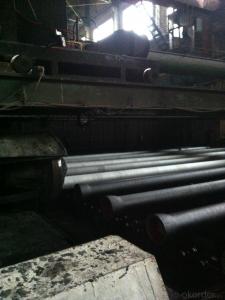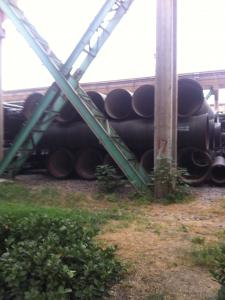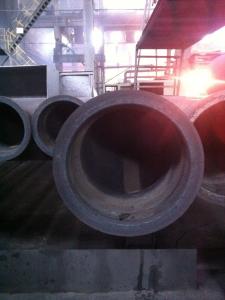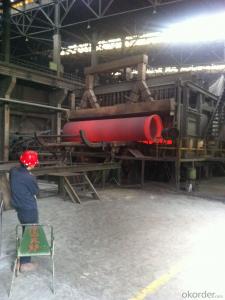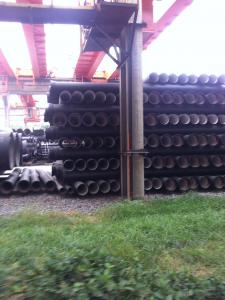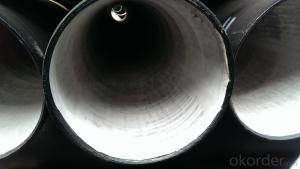DUCTILE IRON PIPES AND PIPE FITTINGS K9 CLASS DN300
- Loading Port:
- Tianjin
- Payment Terms:
- TT OR LC
- Min Order Qty:
- 22 pc
- Supply Capability:
- 3000 pc/month
OKorder Service Pledge
OKorder Financial Service
You Might Also Like
Material : Ductile Cast Iron
Size Range : DN 80mm to DN 2000mm
Unit Effective Length : 6m or 5.7m
Manufacture Standard: ISO 2531:1998/ EN 545:2006/EN 598:2007
Annual capacity : 200,000 tons
Coating Exterior: Zinc 130g/m2 according to ISO 8179-1 and bitumen coating 70 microns.
Cement Interior: Portland Cement/ High Alumina Cement/ Sulphate Resisting Cement Lining according to ISO 4179
Special requirements on external coating and internal lining can be applied
We also provide accessories such as SBR/EPDM rubber gaskets, lubricant paste, pipe caps, PE sleeves, etc.
Additional Parts:
Each pipe is strictly inspected according to related standard to ensure permanently high performance.
Easy Installation at site and service free for life
Long Service Lifespan
Quotation will arrive you within 24hours once we get your inquiry.
We guarantee offering you a competitive price.
A copy of original inspection reports of pipes will be offered after shipment.
Photos of loading process will be sent to the customer after shipment effect.
We will follow-up the delivery progress after shipment effect and update to the customer on weekly basis.
- Q: How do ductile iron pipes perform in high-temperature water applications?
- Ductile iron pipes possess remarkable strength, durability, and exceptional mechanical properties, rendering them suitable for diverse applications. However, certain factors must be taken into consideration when utilizing them in high-temperature water scenarios. Typically, ductile iron pipes exhibit satisfactory performance in high-temperature water settings up to a specific threshold. The exact temperature constraint hinges on the particular grade of ductile iron employed and the duration of exposure to elevated temperatures. Generally, ductile iron pipes can endure temperatures ranging from 350 to 400 degrees Fahrenheit for brief periods without suffering significant deterioration or loss of strength. Nevertheless, it is crucial to acknowledge that prolonged exposure to high temperatures can have adverse effects on ductile iron pipes. When subjected to elevated temperatures, these pipes may undergo thermal degradation, which can result in diminished mechanical properties, heightened brittleness, and even eventual cracking or failure. To mitigate the risks associated with high-temperature water applications, several precautionary measures can be implemented. Firstly, selecting a suitable grade of ductile iron with an elevated temperature tolerance can enhance the pipes' performance. Secondly, incorporating adequate insulation or heat shielding measures can minimize direct heat transfer to the pipes, thereby reducing the likelihood of thermal degradation. Furthermore, frequent monitoring and maintenance of ductile iron pipes utilized in high-temperature water settings are crucial to promptly identify any indications of degradation or damage and take appropriate remedial actions to prevent failure. In conclusion, although ductile iron pipes typically perform well in high-temperature water applications, it is imperative to thoroughly evaluate the specific conditions and requirements of the application to ensure their sustained performance and integrity.
- Q: Are ductile iron pipes prone to external corrosion?
- External corrosion is not typically a concern for ductile iron pipes. This is because the material itself has protective properties. Ductile iron pipes are composed of a durable and strong material with a significant amount of graphite. The graphite serves as a natural barrier against external corrosion, effectively preventing rust and oxidation. Furthermore, ductile iron pipes are often coated with a layer of protection, such as cement mortar or polyethylene, to further enhance their resistance to corrosion. These coatings provide an additional safeguard, preventing contact between the pipe and any corrosive substances in the environment. It is important to note, however, that localized corrosion may still occur under certain conditions. Factors such as soil composition, moisture levels, and the presence of specific chemicals can potentially lead to the corrosion of ductile iron pipes in specific areas. Therefore, regular inspections and proper maintenance are necessary to promptly identify and address any potential corrosion concerns. In conclusion, ductile iron pipes are generally highly resistant to external corrosion. Nonetheless, like any other material, they require appropriate care and maintenance to ensure their long-term durability and reliability.
- Q: Can ductile iron pipe be used for both water and sewage applications?
- Ductile iron pipe is versatile and can be used for both water and sewage applications. It is known for its strength, durability, and corrosion resistance, making it suitable for various purposes. With its high tensile strength, it can withstand the pressure and heavy loads associated with water and sewage systems. Its smooth interior surface minimizes friction and enhances flow efficiency, making it perfect for transporting water and sewage. It also has excellent resistance to corrosion and chemical attack, ensuring a long lifespan even in harsh environments. Moreover, ductile iron pipe comes in various sizes and configurations, allowing for customization to meet specific water and sewage requirements. In conclusion, ductile iron pipe is a reliable and adaptable option for water and sewage conveyance.
- Q: What material is the cutting tool for ductile iron?
- With pleasure. If necessary, you can also describe your processing work and so on, I help you analyze, recommend a few corresponding knives to you.
- Q: It's not easy to drill ductile iron with cobalt high speed steel bit. Please help to point it out
- The material can be annealed and the process is simple, that is, heating the workpiece and cooling it naturally. In this way, the hardness of the workpiece can be reduced.
- Q: What's the difference between cast iron pipe and steel pipe?
- Cast iron pipes (Cast, Iron, Pipe), cast cast pipe. Cast iron pipes are used for water supply, drainage and gas transmission lines. They include cast iron pipes and pipe fittings. Labor intensity is small. According to the casting method, it is divided into continuous cast iron pipe and centrifugal cast iron pipe, in which the centrifugal cast iron pipe is divided into sand mould and metal type two kinds. Divided into gray cast iron pipe and nodular cast iron pipe according to different material. According to the interface form, it is divided into flexible interface, flange interface, self anchored interface, rigid interface and so on. Among them, the flexible iron pipes rubber sealing ring; flange interface cast iron pipe flange fixed in the rubber pad, the flange gasket sealing; rigid interface cast iron pipe socket is large, straight pipe is inserted, sealed with cement, this technology has been basically eliminated
- Q: Principles for the antiseptic treatment of ductile iron pipes
- The principle that the antiseptic treatment of ductile iron pipes must be complied with is that.1. internal and external surface coating shall be kept clean, remove rust and impurities2. after coating on the inside and outside surface, the coating should be even and smooth, firm and firm, and shall not be abnormal because of climate change3. coating for water delivery should be insoluble in water, no peculiar smell, harmful impurities content
- Q: Are ductile iron pipes suitable for tunneling projects?
- Yes, ductile iron pipes are suitable for tunneling projects. Ductile iron pipes are known for their strength, durability, and flexibility, making them an ideal choice for underground tunnels. They can withstand high pressure and heavy loads, making them suitable for various tunneling applications such as water and sewer systems. Ductile iron pipes also have excellent corrosion resistance, which is essential in underground environments where they may be exposed to moisture, chemicals, and other corrosive elements. Additionally, ductile iron pipes are relatively easy to install and maintain, making them a cost-effective option for tunneling projects. Overall, ductile iron pipes offer the necessary qualities required for tunneling projects, making them a suitable choice for such applications.
- Q: How are ductile iron pipes tested for hydrostatic pressure?
- Ductile iron pipes are commonly used for water and wastewater applications due to their strength and durability. To ensure the quality and reliability of these pipes, they undergo hydrostatic pressure testing. Hydrostatic pressure testing involves subjecting the ductile iron pipes to internal pressure higher than their normal operating pressure. This is done to assess their ability to withstand the maximum pressure they are expected to encounter during their service life. The testing process typically begins with the selection of a sample set of pipes from a production batch or shipment. These samples are carefully prepared by removing any surface coatings or debris that could affect the accuracy of the test results. Next, the prepared samples are placed within a specially designed test rig or test line. The test rig is equipped with all the necessary connections, valves, and gauges to control and monitor the test conditions accurately. Once the samples are secured in the test rig, water or another suitable test fluid is slowly introduced into the pipes. The pressure is then gradually increased to a predetermined level, typically exceeding the expected operating pressure by a certain factor. This elevated pressure is maintained for a specified duration, usually for several hours, to assess the pipes' structural integrity and leak resistance. During the test, the pipes are closely monitored for any signs of leakage, deformation, or failure. Skilled technicians or engineers observe the pressure gauges and visually inspect the pipes for any visible defects or abnormalities. Additionally, automated systems may be employed to continuously record and analyze the pressure readings, ensuring accurate data collection. After the specified test duration, the pressure is gradually released, and the pipes are carefully inspected for any permanent deformation or residual stress. This inspection may involve visual examination, dimensional measurements, or even non-destructive testing techniques such as ultrasonic testing or magnetic particle inspection. The test results are then evaluated against the relevant industry standards or specifications to determine the pipes' compliance with safety and performance requirements. If the pipes pass the hydrostatic pressure test, they are deemed suitable for their intended application. However, if any issues or failures are identified, further investigation, analysis, or corrective actions may be necessary before the pipes can be approved for use. Overall, hydrostatic pressure testing plays a crucial role in ensuring the quality and reliability of ductile iron pipes. By subjecting these pipes to rigorous testing procedures, manufacturers can provide customers with pipes that meet the highest standards of safety and performance.
- Q: How do ductile iron pipes perform in freeze-thaw cycles?
- Ductile iron pipes demonstrate exceptional performance in freeze-thaw cycles due to their material properties. With high tensile strength and excellent impact resistance, ductile iron is highly resistant to the stresses caused by freezing and thawing. Unlike other materials, these pipes can withstand the expansion and contraction during temperature changes without cracking or breaking. One of the primary reasons for the success of ductile iron pipes in freeze-thaw conditions is their capacity to absorb and dissipate stresses. The material's high ductility allows for slight deformation under stress, releasing pressure and preventing pipe damage. This characteristic ensures that the pipes can endure repeated freezing and thawing cycles without compromising their structural integrity. Furthermore, ductile iron pipes feature a durable and protective coating, such as cement mortar lining or polyethylene encasement, which further enhances their resistance to freeze-thaw cycles. These coatings offer an extra layer of protection, preventing direct contact between water and the iron and reducing the risk of corrosion. Moreover, ductile iron pipes have an extended service life, often exceeding 100 years, thanks to their inherent strength and resistance to various environmental factors, including freeze-thaw cycles. The pipes' ability to endure these cycles without significant damage ensures the reliability and durability of water distribution systems, even in regions prone to freezing temperatures. In conclusion, ductile iron pipes are highly dependable and excel in freeze-thaw cycles. Their high tensile strength, impact resistance, capacity to absorb stresses, and protective coatings make them the preferred choice for water distribution systems in areas with harsh winter conditions.
Send your message to us
DUCTILE IRON PIPES AND PIPE FITTINGS K9 CLASS DN300
- Loading Port:
- Tianjin
- Payment Terms:
- TT OR LC
- Min Order Qty:
- 22 pc
- Supply Capability:
- 3000 pc/month
OKorder Service Pledge
OKorder Financial Service
Similar products
Hot products
Hot Searches
Related keywords
